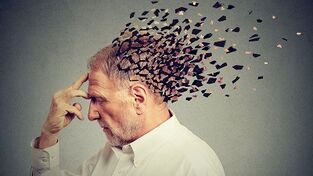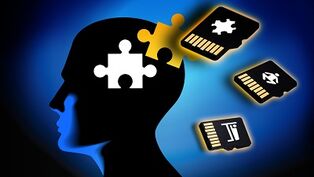
There are diametrically opposed opinions about drugs to improve memory. Some say it is helpful and helps to cope with increased intellectual stress that it really helps and effectively.
Others say that it is just a myth that taking such drugs does not bring any benefits, which can be harmful and even addictive to these drugs. Let’s try to discuss both points of view in more detail and find out who is right.
About a bit of memory
Memory is a mental function of higher nervous activity that helps to accumulate, retain, and multiply previously received information. Memory allows you to save information about the outside world or the body's reaction to any impact for a long time, as well as allows you to use this information for the correct organization of activities in the future.
Memory involves several different but related processes.
- Remember- input new data, sensations.
- Storage- data accumulation, sensations include processing and mastering them. This process allows a person to learn, develop thinking and speech.
- Multiplication and recognition- actualization of elements, actions, feelings from the past. Reproduction is involuntary (elements "fly" in the human mind without his will and effort) and arbitrary.
- Oblivion- Loss of ability to multiply and recognize elements that were previously remembered. It can be temporary or permanent. Incomplete oblivion is when information is reproduced or referenced in error or in part.
Basic types of memory
There are many types and subtypes in the memory classification. Let’s talk about its main types.
- Sensory memory- Retaining information from emotions after stimulating them.
- Tactile Memory- Retention of information from touch by receptors.
- Automotive Memory- Saving information about movement Many remember that there are movements that they perform automatically.
- Semantic Memory- Saving information about facts, for example, learned stories, dates, multiplication table.
- Short-term memory- Save information in a short time. Has a small volume.
- Long-term memory- Storage of information for an indefinite period of time, including a lifetime.
Memory laws

Few people know that there are a number of laws of memory. These are not inventions of the author, but scientifically established and proven life patterns.
- Law of Repetition- Information is much better remembered if repeated several times.
- Law of Interest- If a person is interested in information, then he remembers it faster and better.
- Law on the Edge- You remember the information at the beginning and end best.
- Law of Understanding- If the information is deeply thought out, then it will be better remembered.
- Optimum Row Length Law- The amount of information stored should not exceed the amount of short-term memory.
- Installation Act- A person who has given himself an installation that needs to memorize certain information will remember it faster and better.
- Inhibition Law- When memorizing such concepts, the old information "overlaps" the new one.
- >
- Law of Action- If what is memorized is put into practice, then memorization becomes more efficient and faster.
These rules can be used if you want to memorize things faster and better, as well as train your memory.
Causes of Memory Loss
- Organic brain damage- Acute cerebrovascular accident, Traumatic brain injury, Brain tumor.
- Diseases of other organs and systems- Diseases of the liver, cardiovascular system.
- External factors- Poor ecology, abrupt change in environmental conditions, stress, sleep disorders.
- Age-related changes in brain structure- reduction in the number of interneuronal connections.
- Chronic intoxication- smoking, drug use, substance abuse, alcoholism, drug addiction (tranquilizers, tranquilizers).
Treatment of memory disorders
Medications are prescribed immediately if memory needs to be improved. First they try to use non-narcotic methods. This includes:
- Walks fast in the fresh air. This increases the brain's access to oxygen. This improves the efficiency of its work.
- Normalize sleepand wakefulness. It is better to do evening training before going to bed.
- Positive attitude, do not talk about it- Do not think that you have a bad memory, no one cancels the effect of self-hypnosis. If at some point you can not remember something, do not worry, do not get angry, but instead divert attention, do something else and then try again to remember what you forgot.
- Daily Training- Solve crosswords, puzzles, scandalous words.
- Education- Learn poetry, foreign languages, do it regularly, gradually increase the amount of material.
Medication for memory loss

It is clear that learning poetry, a foreign language, solving puzzles is not easy, you need to "strain", you have to spend extra time walking and solving puzzles, which a working person practically does not have.
It is much easier to take pills, relax and rely on the magic power of medicine - memory will improve immediately and you will not have to do anything! The inhabitant of the modern city is so lazy and spoiled by the fruits of civilization that now few people are so purposeful and want to spend their time and energy on memory training. So people are looking for an answer to their question - what pills are there to improve memory?
So let us consider two opposing views on this issue:
Positive opinion
Proponents of using these funds say that a number of medications stimulate the blood supply to brain cells, thereby improving their nutrition and delivering more oxygen, which improves metabolic processes in neurons.This is facilitated by nootropics and medications that improve the rheological properties of the blood.
Herbal preparations are widely used, which not only improve metabolic processes in neurons, but also enhance the action of nootropic drugs.
But we must remember that any (absolutely any) drug has its own contraindications and side effects, so it should be prescribed only by a doctor in each specific clinical case.
Negative opinion
According to some experts, there is a downside to the coin. A few years ago, experts puzzled the question - are these drugs effective or is it just a placebo effect?
The effectiveness of nootropics has not been proven in many studies. There is no evidence that they have a beneficial effect on memory. One small study of the effectiveness of medications confirmed that they have little effect, but not in severe cases.
Traditional methods and herbal preparations such as ginseng, vitamin E are practically not researched. Evidence is based only on the use of herbal remedies in patients with dementia. But there are no data on the effectiveness of use in relatively healthy people.
In conclusion, I want to say that when you think about which medications are best for improving memory, do not forget that they should be prescribed by a doctor. The physician should also evaluate the effectiveness in each case. Do not rely on the advice of friends, neighbors or relatives.
If you think your memory has deteriorated, consult a neurologist. Maybe this is not a problem at all, attention may be disturbed, there may be other problems as well. It is also necessary to find out the cause of this condition. And this can only be done by a qualified doctor.







































































